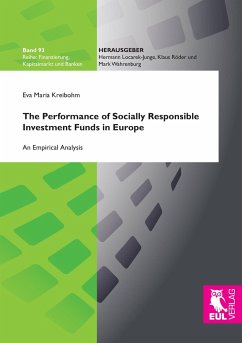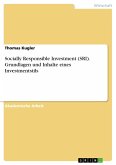Socially responsible investing (SRI) is an investment approach that combines investors¿ financial as well as nonfinancial goals in the security selection process. Technically, investors can engage in SRI either by directly investing in companies that implement corporate social activities or by investing their money in SRI funds, which apply screening criteria to select securities. The screening process applied by the SRI funds has led to controversy among academics regarding whether the use of SRI screens in the security selection process influences the financial performance of the funds. The empirical study analyzes whether or not the screening process applied by such funds influences their financial performance. Previous research mostly has focused on analyzing the performance of SRI equity funds established in the United States. The study at hand not only includes SRI equity funds, but also SRI balanced and fixed income funds established in Europe, the biggest market for SRI globally. The study provides unexpected results that are not only of interest for investors, who want to get a better understanding of the effect on the financial performance of their portfolios in case SRI funds are added. The results are also relevant for SRI fund managers, who are interested in promoting their funds and attracting (new) investors, and for academics, whose research interests are e. g., located in the fields of SRI, fund portfolio performances and market efficiencies.
Hinweis: Dieser Artikel kann nur an eine deutsche Lieferadresse ausgeliefert werden.
Hinweis: Dieser Artikel kann nur an eine deutsche Lieferadresse ausgeliefert werden.








